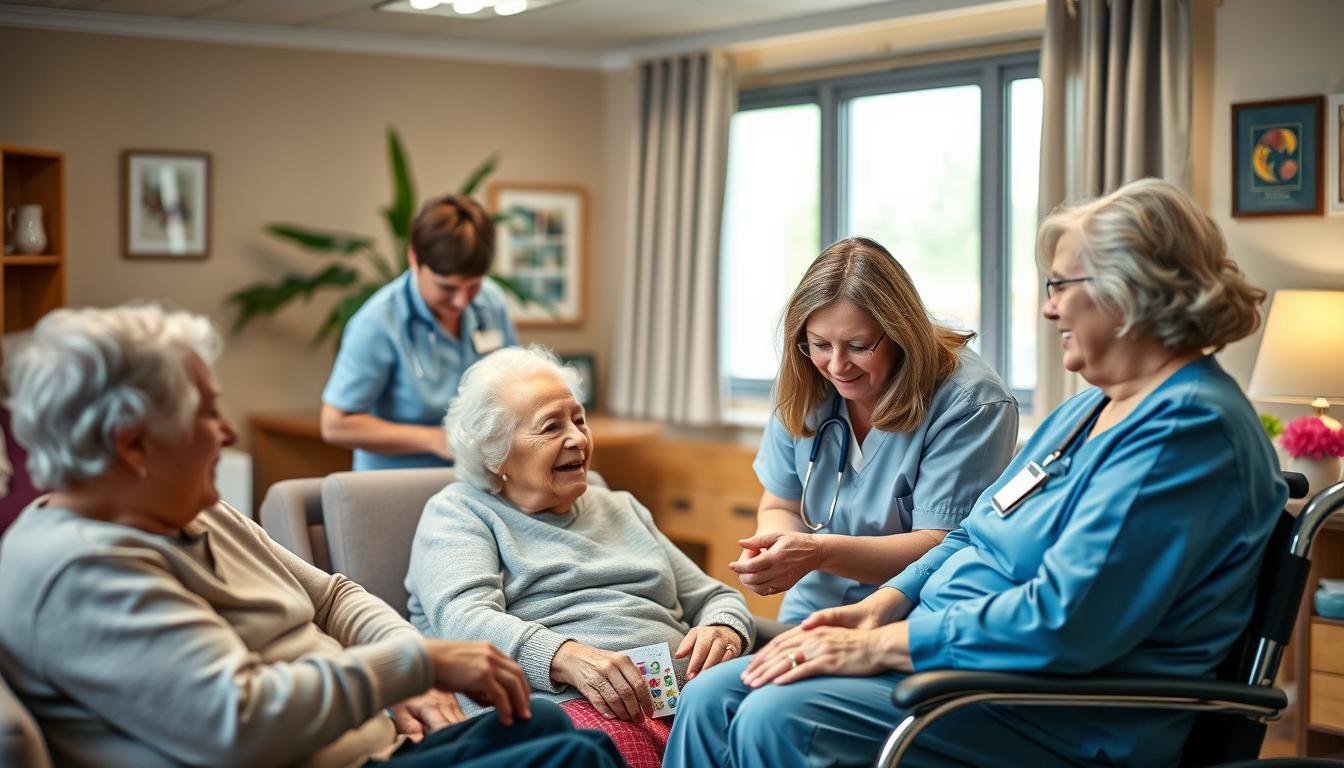Essential Nursing Home Skills for Caregivers
Ever thought about what makes a great caregiver in a nursing home? It’s not just about having a caring heart. It’s about having skills that truly change lives. Caregivers need to be skilled in compassionate care and managing many tasks at once.
Nursing home skills are more than just knowing about health. They include a variety of skills that help caregivers give the best care to the elderly. The National Council of Certified Dementia Practitioners (NCCDP) highlights how important these skills are, especially for those with memory loss. Skills like good communication, sharp observation, and patience are key for caregivers.
In nursing homes, showing compassion is a must. Caregivers need to connect with residents, understand their non-verbal cues, and show empathy. These skills, along with physical strength and quick thinking, are what make elderly care quality.
Key Takeaways
- Compassion and empathy are crucial for providing quality care in nursing homes
- Effective communication skills significantly improve resident satisfaction
- Physical stamina is essential for performing daily caregiving tasks
- Strong observational skills can lead to early detection of health issues
- Flexibility and adaptability contribute to better overall resident care
- Organizational skills help reduce medication errors and missed appointments
Understanding the Role of a Nursing Home Caregiver
Nursing home caregivers and in-home care givers are key in long-term care. They offer vital healthcare services and support to those who need help with daily tasks. Their work is varied and challenging, needing special skills and qualities.

Responsibilities and Daily Tasks
Caregivers in nursing homes have many tasks. These include:
- Assisting with personal hygiene
- Administering medications
- Helping with mobility
- Providing emotional support
- Monitoring health conditions
The National Council of Certified Dementia Practitioners says caregivers need thorough training to handle these tasks well.
Importance in Long-Term Care
Caregivers are crucial in long-term care. They make sure residents are happy and well cared for. Their role is not just about physical care but also emotional support and friendship. Good communication is key, building trust with residents.
Challenges and Rewards
The job has its challenges. Caregivers often look after many residents with complex health issues. They face physical demands like lifting or moving people. Managing time well is important, balancing meds, appointments, and daily routines.
But, caregiving is rewarding. It brings the joy of making a difference in people’s lives. Caregivers form deep bonds with residents and their families. This adds a sense of purpose and fulfillment to their work.
“Patience is a fundamental trait for caregivers, enabling them to remain calm and composed in challenging situations, offering individuals in their care a sense of ease and normalcy.”
Effective Communication in Nursing Home Care
Communication is key in nursing home care. It affects how well patients are helped and how well seniors stay well. Caregivers need to learn different ways to talk with residents, families, and other health workers.
Verbal and Non-verbal Communication Techniques
Talking clearly and understanding body language is vital for helping older people. Caregivers should not use elderspeak, which can make talking hard. They should talk in a kind and respectful way instead.
Active Listening and Empathy
Listening well and feeling empathy are important for trust with residents. Being kind in healthcare helps people get better faster and manage long-term illnesses better. Using memory books with personal stories helps staff talk better with residents.
Communicating with Families and Healthcare Professionals
Talking well isn’t just with the residents. Caregivers must share important health news with families and work with health workers. This keeps care consistent and lowers the chance of mistakes.
| Communication Skill | Impact on Patient Care |
|---|---|
| Verbal Communication | Improves understanding of care instructions |
| Non-verbal Communication | Enhances trust and comfort |
| Active Listening | Reduces anxiety and improves patient satisfaction |
| Empathy | Aids in faster recovery and better chronic illness management |
By getting better at these communication skills, caregivers can greatly help patients and seniors in nursing homes.
Essential Nursing Home Skills for Caregivers
Caregivers in nursing homes need many skills to give good care to the elderly. These skills are key for giving full healthcare services to the residents.
Personal Care and Hygiene Assistance
Caregivers are key in keeping residents clean. They help with bathing, dressing, and grooming. Now, 58% of caregivers help with nursing or health care, like caring for wounds and checking vital signs.
Medication Management and Administration
It’s very important to manage medications right in nursing homes. Caregivers must give out meds correctly, watch for side effects, and keep good records. They need to be very careful and know a lot about different medicines.
Mobility Support and Fall Prevention
Helping residents move around safely and preventing falls are big tasks. Caregivers help with moving people, getting them to move more, and making sure the place is safe. This keeps residents independent and lowers the chance of getting hurt.
Nutrition and Meal Assistance
Good nutrition is key for the elderly. Caregivers help plan meals, feed people, and watch for diet rules. They make sure people get the right food to stay healthy and happy.
| Caregiver Skill | Importance | Training Hours |
|---|---|---|
| Personal Care | High | 30 |
| Medication Management | Critical | 25 |
| Mobility Support | High | 20 |
| Nutrition Assistance | Medium | 15 |
Learning these key nursing home skills is vital for good care. Programs like the Career Pathways Program offer a lot of training. With 120 hours of classes in five paths, it helps caregivers feel less depressed and isolated, and improves patient care.
Emotional Support and Compassionate Care
Compassionate care is key in nursing homes. A study at Isfahan University of Medical Sciences found important parts of emotional care in healthcare. It looked at 36 nurses, 20 patients, and 8 family members. The study found four main areas: using words and actions to show feelings, showing empathy, focusing on the patient, and respecting different cultures.
Nursing home staff are crucial for caring for the elderly and keeping them well. They make a caring place that honors the dignity of residents and makes their lives better. This matches what the U.S. National Institutes of Health say. They found that caring care makes patients happier and does better.
Feeling empathy is a big part of caring for nursing home residents. Studies show empathetic nurses lower depression and stress in patients, making them happier. Nurses who work on themselves get better at handling stress and staying hopeful.
“The ability to communicate effectively any issues related to a decrease in the quality of patient care is vital for nurses in fostering a caring environment within healthcare organizations.”
To give the best care, nursing home staff should work on emotional smarts, bouncing back from tough times, thinking critically, understanding different cultures, and feeling confident. These skills help them build strong bonds with residents and support them well as they age.
| Key Components | Impact on Patient Care |
|---|---|
| Empathy | Reduces depression and stress |
| Effective Communication | Improves patient-nurse relationships |
| Cultural Awareness | Enhances respect and inclusivity |
| Emotional Intelligence | Facilitates better patient outcomes |
Time Management and Organizational Skills in Nursing Homes
Effective time management is key for caregivers in nursing homes. It helps ensure quality healthcare and proper care for residents. A study found 66.1% of health professionals manage their time well, showing its value in care settings.
Prioritizing Tasks and Managing Multiple Residents
Caregivers must handle many tasks at once. Research shows health pros spend only 9-22% of their time with patients. To do better, they should:
- Prioritize direct patient care
- Reduce time on non-clinical tasks
- Stay away from too much socializing
Record-keeping and Documentation
Keeping accurate records is vital in nursing homes. But, long paper records can take up too much time. Making these processes easier can give more time for caring for residents.
Adapting to Unexpected Situations
Caregivers need to be flexible for emergencies and regular care. A study showed nurses who learned about time management did better at their jobs. Important skills include:
- Quick problem-solving
- Efficient task prioritization
- Adjusting schedules as needed
By getting good at these skills, caregivers can offer better care and make nursing homes more organized and efficient.
Conclusion: The Impact of Skilled Caregivers in Nursing Homes
Skilled caregivers are key to improving life for those in nursing homes. They use their nursing skills and care to support seniors in long-term care. With more seniors expected by 2030, especially in places like Tucson, Arizona, the need for these workers will grow.
In the U.S., there are about 44 million caregivers over 18, adding up to $257 billion in unpaid work. Interestingly, 40% of these caregivers are men, a 50% increase from 1984 to 1994. This shows how crucial skilled caregiving is today.
Caregivers in nursing homes and assisted living work all day, every day. They help with daily tasks and emotional support. Their work helps not just the seniors but also their families and communities. With more seniors needing care, places like Tucson Assisted Living Retreat are looking for skilled caregivers. They offer good pay and chances to grow in this fulfilling career.
Source Links
- Necessary Qualities of a Caregiver – Ideal Home Care Services
- The Top 10 Skills Caregivers Need to be Successful – Colavria Hospitality
- What Are The Most Important Skills For Caregivers In Assisted Living To Have?
- 8 Essential Caregiver Skills You Need To Succeed – NCCDP
- Family Caregiving Roles and Impacts – Families Caring for an Aging America
- The Importance of Effective Communication in Nursing | USAHS
- 10 Strategies for Communicating Effectively With Senior Care Residents
- Communication skills training in a nursing home: effects of a brief intervention on residents and nursing aides
- 8 Essential Caregiver Skills – California Mobility
- California’s Center for Caregiver Advancement Emphasizes Skills Needed for Caregivers, Nursing Home Staff
- Components of Compassionate Care in Nurses Working in the Cardiac Wards: A Descriptive Qualitative Study
- 5 Essential Skills for Compassionate Care in Nursing | Kirby Bates
- “Time wasted by health professionals is time not invested in patients”: time management practice and associated factors among health professionals at public hospitals in Bahir Dar, Ethiopia: a multicenter mixed method study
- What is Time Management in Nursing? (PLUS, Importance, How to Improve, & Barriers)
- Factors influencing time management skills among nurses in North West Bank, Palestine – BMC Nursing
- Supporting Family Caregivers in Providing Care – Patient Safety and Quality
- The Growing Importance of Senior Care – Tucson Assisted Living Retreat







